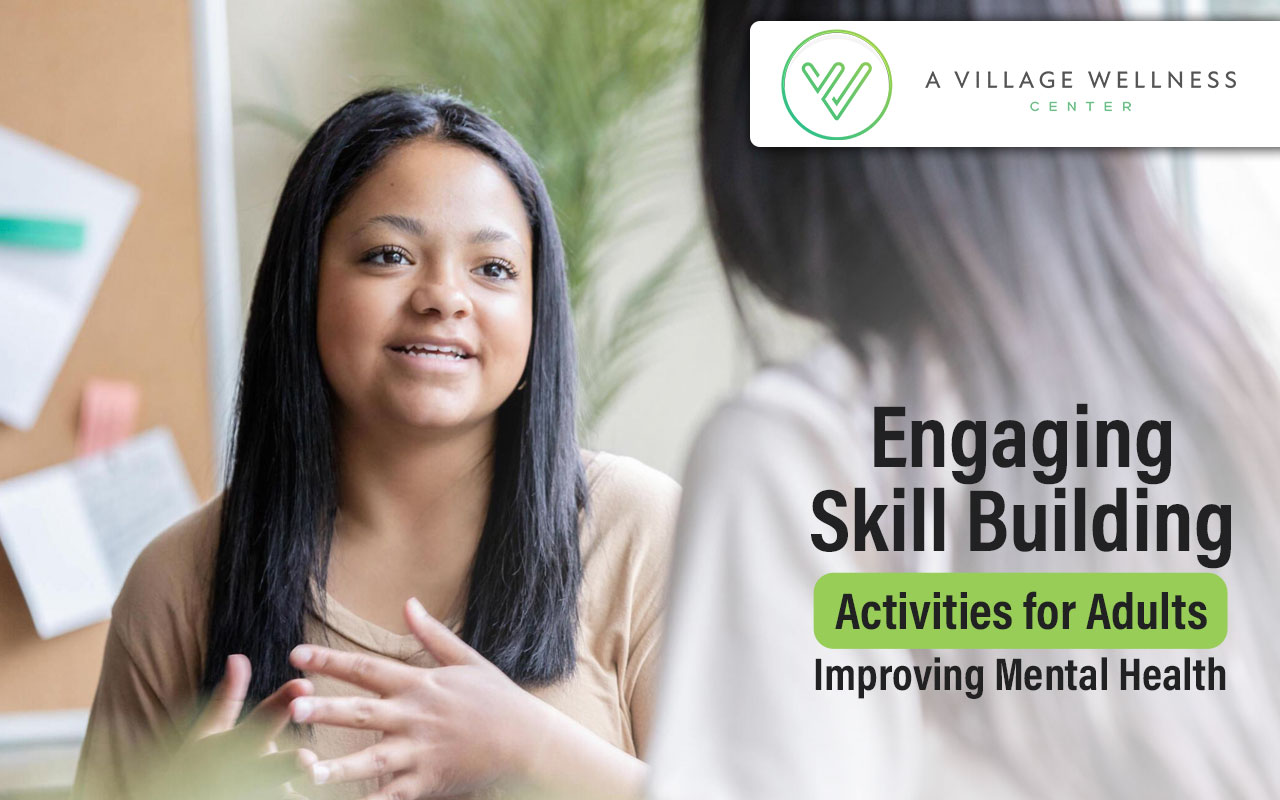Mental health has three components: emotional, psychological, and social wellness. It is a vital part of our behavior that permeates how we think, feel, and act, being strong enough to help us handle stress, relate to others, and make crucial decisions. Engaging in mental health skill-building activities for adults like Therapy, mindfulness, and self-care can improve quality of life.
Human beings can participate in different activities that aim to improve great mental health. They usually aim to boost coping skills, stress-reducing programs, accelerate emotional resiliency, and more. Hence, these activities include counseling, mindfulness, meditation, physical exercise, social support, and hobbies.
Talking about mental health and these solutions implies that mental health is no different from any other component of your general well-being, and it isn’t hard to practice things that nurture your mental health. Mental health skill-building activities for adults in Silver Spring, MD, can help us overcome these problems. These adult programs are designed not only to acquire helpful techniques to combat the hassle but to do so actively, mainly by improving your mental health and resilience skills.
The skill set of mental health covers everything, such as managing day-to-day stress and overwhelmed emotions and healthily regulating them. These skills are the ones that provide us with the tools to cope with life’s ups and downs, help us maintain healthy relationships with others, and assist us in regulating stress.
Resources for Mental Health Skill-building
Sometimes, it becomes quite challenging to pinpoint the mental health skill-building resources. Thankfully, many options exist. Interpersonal Support neighborhoods, Mental health organizations, and online resources could all be of help. Supportive groups and workshops afford the healthcare learning process; in the course of it, they make it possible to advance and gratify this process.
Understanding Mental Health Skills
Mental health skills are people’s abilities and techniques to manage their mental health and life issues. These skills are crucial for stress, mood, and relationship management. Mental solid health abilities increase mental health and well-being.
Why Mental Health Skills Are Important
Mental health skills enable resilience and strength during life’s challenges. These skills aid stress management, emotion regulation, and relationship wellness. Without solid mental health abilities, life’s obstacles can cause stress, worry, and despair.
Benefits of Mental Health Skill-Building Activities
- Improved overall mental wellness.
- Better stress management.
- Enhanced relationships.
- Recovery of these patients from their symptoms of anxiety and depression.
- Greater self-awareness.
- Improved coping mechanisms.
- Enhanced emotional regulation skills.
- Positive and fulfilling relationships.
- Better conflict resolution skills.
- Increased capacities to deal with various problems that may arise in relationships.
Mental Health Skill-Building Activities For Adults
Coping Mechanisms
Coping techniques help people handle stress and adversity. These strategies can aid emotional regulation and self-control under challenging conditions. Some frequent coping methods are:
Deep Breathing Exercises
Mind-calming deep breathing techniques can relieve tension and anxiety. Breathing helps people focus on the present and reduce overwhelm.
Mindfulness Meditation
In mindfulness meditation, you focus on the present without judgment. This technique can improve emotional regulation and stress by increasing awareness of thoughts and feelings.
Journaling
Journaling can help one understand their emotions and thoughts. Writing down thoughts helps people understand their experiences and set patterns.
2. Stress Management Techniques
People utilize stress management practices to minimize and manage stress. These methods can help people balance daily life. Effective stress management methods include:
Exercise: Regular exercise reduces stress and boosts mood. Exercise releases mood-lifting endorphins, which soothe and energize people.
Yoga: Physical postures, breathing techniques, and meditation alleviate stress and relax. Yoga can help people find peace and balance.
Progressive Muscle Relaxation: Progressive muscle relaxation tenses and relaxes different muscle groups. Release tension and lessen stress and anxiety using this method.
3. Emotional Regulation Strategies
Emotional regulation is healthy and productive emotion management. It requires emotional awareness, expression, and control. Here are some ways people control their emotions:
Cognitive Reorganization
Cognitive restructuring involves identifying and confronting harmful thought processes that cause negative emotions. People can gain perspective and minimize emotional distress by modifying these mental patterns. Cognitive-behavioral therapy (CBT) uses this method to treat anxiety, sadness, and other emotional difficulties.
Self-Compassion
Self-compassion means being gentle to oneself, especially during emotional turmoil. It entails admitting pain and showing compassion, like a friend in need. Self-compassion boosts resilience, mental health, and emotional regulation.
Finding Mental Health Skill-Building Resources Near Me
Developing and maintaining adult mental health requires finding local mental health skill-building activities for adults. Local resources offer assistance, direction, and growth.
Tips for Finding Mental Health Skill-Building Activities for Adults Near Me
- Community centers often have mental health training sessions, group discussions, and courses to attend. Call the community building or search for the local city website to obtain details on the open programs.
- Support groups for mental health skills have successful generations of upskilling for personality development and networking with people who have experienced the same challenges. Consider connecting with a community support group by visiting a community center, a hospital, or online directories.
- Online resources especially allow you to use your home environment as an asset in gaining mental health skills. Seek the most known websites and mobile applications that offer certified guided meditation, stress mitigation methods, and other mental health services.
- Non-governmental organizations at the local level frequently run different programs, such as a workshop on skills development and a group providing the required support. Contact the dedicated agency in your local area to get the details.
- With one-on-one guidance from a therapist/ counselor, acquiring and developing the skills necessary for maintaining mental health is possible. If you find it hard to afford or get resources or need more assistance, try engaging in counseling services.
Read More: The Importance of Mental Health Skill Building Services
Final Thoughts!
Adults seeking mental health skills must engage in mental health skill-building activities for adults. They can improve stress management, emotional control, and quality of life by acquiring and strengthening these skills. There are various ways to improve mental health and live happier, healthier lives, including coping mechanisms, stress management, and emotional control.
Effective stress, emotion, and relationship management requires mental health abilities.
Mental health skill-building improves mental health, stress management, and relationships. Find local mental health skill-building options for personalized assistance and guidance.




